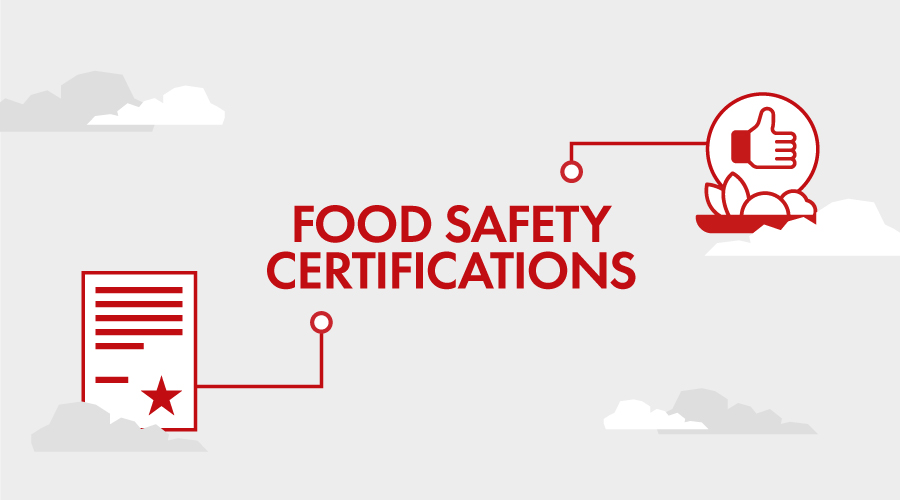
What are the Food Safety Certifications? How can they benefit your Business?
27th Mar, 2020
Food Safety Certification validates that the food business is managed by following healthy practices that ensure safety and quality. The environmental and other management systems are also required to be up to the mark along with the legal and standard compliant. If your business is associated with foods either directly or indirectly, you are eligible to get food safety certification. From legal compliance to market requirements, there are many reasons why a food business must have appropriate food safety certifications. Some of the reasons to consider getting food certifications are:
- To maintain food quality
- To ensure safety and well-being of the consumers
- To avoid food hazards and risks
- To get global recognition
- To gain trust of customers, stakeholders and vendors
- To become legal compliant
- To validate that the practices are healthy and safe
Here is the list of Food Standards and Services that you can incorporate in your organization irrespective of the size or the product. The objective of the services is to help businesses maintain a standard quality, safety and efficient practices which in return enable them to gain customer trust along with global recognition.
ISO 22000 FSMS
ISO 22000 Certification is applicable to all the types of food suppliers as it provides assurance within the food supply chain at the national as well as international level. With globalization increasing and easier inter-state and international expansion, it has become essential to ensure the safety and quality of the foods for the well-being as well as trust of the people.
With ISO 22000 implementation, you can observe the following benefits:
- Reduces exposure to risk
- Improves food safety
- Identify, prevent and control food hazards
- Build a flexible food safety management system within the organization
- Meet food safety legal compliance
- Improve, monitor and measure food safety performance
FSSC 22000
The objective of the FSSC 22000 is to control food safety risks. FSSC stands for Food Safety Management Certification Scheme which essentially provides structured plans and system for managing food safety risks and as a result, safe products.
Since it fulfils all the Global Food Safety Initiatives (GFSI) benchmark requirements, the FSSC 22000 is widely accepted and recognized as a trustworthy certification across the globe. It is applicable to the food, feed and food packaging manufacturing and supplying sector. Also, its flexibility allows food businesses to integrate with other management systems for quality, environment, health as well as safety.
Some of the unique benefits of FSSC 22000 include:
- Risk management through creating an environment which allows safe product production
- Continual management, monitoring, validation and improvement in the system
- Increased market reach due to its acceptance
- Consistency in the quality offerings
- Operational efficiency
HACCP
HACCP stands for Hazard Analysis Critical Control Points. Similar to other food safety management standards, it also demonstrates strong ethics, healthy food practices and your commitment to your customers for trading and producing safe food.
HACCP specifically used for preventing microbiological, chemical and physical contamination in the food production and supply. Unlike many standards, it follows an evidence-based approach which enhances its efficiency and accuracy. Benefits include:
- Identify food risks
- Establish critical control points
- Set critical limits
- Ensure control measures are validated verified and monitored
- Fulfill market requirements
BRCGS Food and BRCGS Packaging & Packaging Material
BRC stands for British Retail Consortium which introduced BRCG – British Retail Consortium Global Standards for the food and manufacturing industries with the purpose of empowering manufacturers to efficiently fulfil legal obligations as well as ensure safety of the consumers.
The BRCG food standard is developed to ensure quality, hygiene and product safety in the food industry. The BRCGS packaging focuses on the packaging that is associated with the foods. It focuses on the hygiene risks of the packaging materials. It is applicable to the manufacturers of packaging and packaging materials that are utilized in food packaging, filling operations as well as packaging materials for cosmetics, toiletries, cosmetic products, etc. Some of the major benefits include:
- Minimize duplication of evaluation
- Global recognition since it is GFSI recognized
- Cost efficiency and reduction in product complaints, returns, and rejections
- Ensured quality, hygiene and product safety
- Consistent improvement and reduction in waste
FAMI – QS
FAMI – QS certification is a profound Quality and Feed Safety Management System known at a global level for feed ingredients. The feed ingredients are intentionally added ingredients that may or may not carry any nutritional value and affect the characteristics of the original feed or animal products as well as animal performance. FAMI QS code helps in encouraging measuring and monitoring the safety of and quality of feed additives and premixtures. Some of the benefits include:
- Increased hygiene
- Improved traceability of the production
- Risk management
- Safety and quality of the production
- Time and cost efficiency
SQF
SQF stands for Safe Quality Food. It is a certification provided by GFSI (Global Food Safety Initiative). It is a sole certification that provides the standardized safety management requirements for manufacturers and suppliers across the globe. The SQF certification demonstrates your compliance with international and domestic food safety regulations which ultimately provides assurance to the suppliers and customers that the produced food products are of high-quality and produced with healthy and standardized practices.
- Enhance process management to identify and manage risks
- Get global recognition
- Increase business opportunities globally
- Reduce material waste
AIB
American Institute of Baking-food (AIB) International is an education body that provides food safety audits, inspection, certification, and educational seminars to food manufacturing and distribution industry. The purpose of the AIB is ensuring quality assurance and food safety. They offer seminars, webinars, web-based training, distance learning, printed, and video materials. Some of the major benefits of AIM include:
- Identify, reduce, eliminate, and prevent food hazards
- Prevent damage and waste
- Improve and maintain a healthy environment for food management
GMP
Good Manufacturing Practice (GMP) certification provides guidelines for the control and management of manufacturing, testing and maintaining control over the quality of the foods and pharmaceutical products. The GMP helps in ensuring that the products are continually produced and controlled as per the defined quality standards.
4C Consulting team of experts has empowered 275+ Clients with efficient food certification consulting, training and implementation to strengthen their food management and manufacturing practices to ultimately empower their food businesses. With 9000+ hours of training and 500+ food certification, we have empowered our clients to successfully implement food standards and gain international recognition, credibility, trust from customers and vendors as well as develop healthy business relations. To know which of the food certifications are most suitable for your business, Contact us now.
![]()
